Students at 2016 Nice rampage now fight global terrorism
Nonprofits offer tech tools to track terrorists, entrepreneurial boot camps for at-risk youth
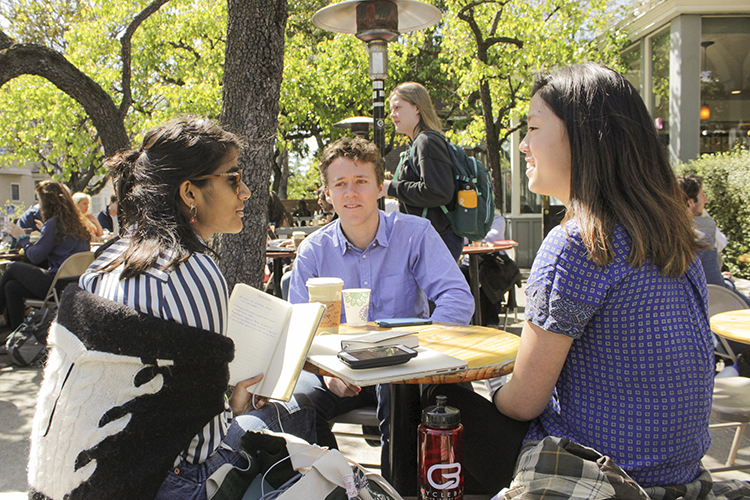
April 30, 2018
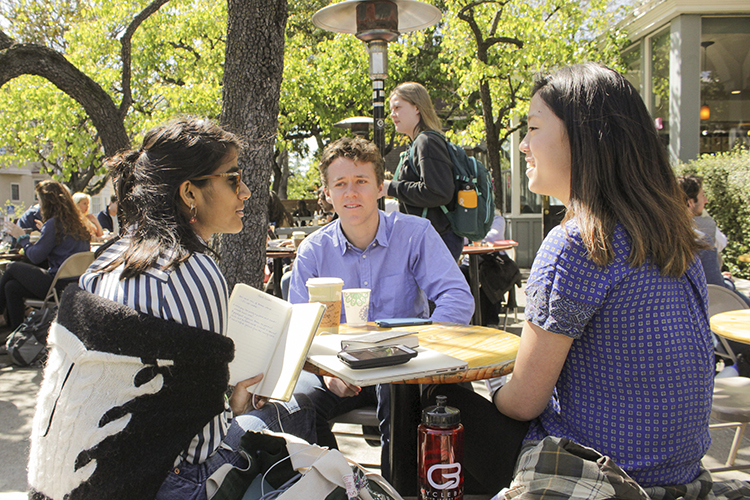
The Archer team — Anjali Banerjee (left), Tyler Heintz and Alice Ma — often works at Caffe Strada. (UC Berkeley photo by Jeremy Snowden)
For three hours, Sasha Gawronska hid in Nice City Hall. It was the night of July 14, 2016, and the UC Berkeley sophomore had just fled the French city’s Promenade des Anglais, where a terrorist in a 19-ton truck had plowed into a Bastille Day crowd, killing 86 and injuring 458.
She’d tried huddling with a few dozen people, some of them bloodied, in the building’s lobby. But she didn’t feel safe. Hearing screams and gunfire outside, Gawronska says she looked elsewhere to hide, fearing someone soon would arrive “and kill us all.”
She found an unlocked electrical closet and wriggled through a vent inside it that led to an empty room. Crouching low, she texted her parents – “I’ll probably not make it home” — and said goodbye and thanks to close friends. Goodbye messages flooded in as word of her situation spread. “It was like attending my own funeral,” she recalls.
Of the 85 Berkeley students that summer in the European Innovation Academy (EIA), a technology entrepreneurship program for young people worldwide, 84 did make it home. Gawronska was unharmed, but Nicolas “Nick” Leslie died, and three others were injured. The EIA lost three students in all. Everyone in the close-knit Berkeley group — 60 of the 85 were on the seaside promenade that night — suffered emotionally.
Says Gawronska, 22, “That night changed our lives forever.”
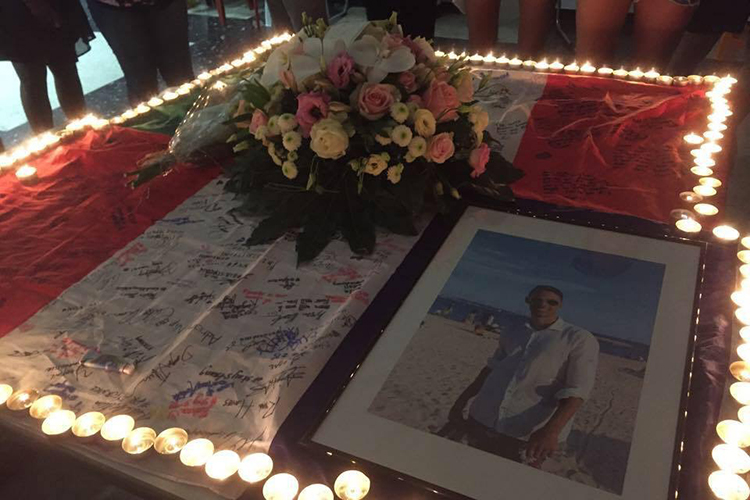
Students held a vigil for Nicolas “Nick” Leslie in their dorm in Nice after the July 14, 2016, terrorist attack. (Photo by Tyler Heintz)
Today, many of the students have embarked on a new mission — fighting global terrorism. They’ve launched two startups that are gaining traction far beyond campus. Nonprofit Archer is building technology to help analysts use big data to track terrorists. Startup With Purpose is a nonprofit that teaches entrepreneurship to 16- to 24-year-olds in the Middle East, where unemployed youth are susceptible to radicalization by extremists.
“Historically, when students at Berkeley see injustice, something that isn’t right, they don’t act like victims, they don’t blame people. They try to fix it,” says Ken Singer, managing director of Berkeley’s Sutardja Center for Entrepreneurship and Technology (SCET), which is headquartered in the College of Engineering, and lead instructor at the annual summer academy.
“We decided we wanted to make a difference with our entrepreneurial spirit,” says Gawronska, a political science and media studies major who’s on the Startup With Purpose team, “and to carry the spirit with us of those we lost.”
Tech tools to track terrorists
The EIA is a three-week boot camp where 500 students from 70 countries learn their strengths and weaknesses, self-organize into multidisciplinary international teams and build startups, then pitch them to angel investors and venture capitalists. It’s considered the largest program of its kind for the number of students and countries involved.
But Anjali Banerjee, 18, from London, says she arrived in Nice in late June eyeing it the way many Brits do — as a vacation paradise. Lacking a major and a career path, she viewed the academy with skepticism.
Then, on July 1, her summer — and life — took a profound turn. In Bangladesh, her close friend Tarishi Jain, a Berkeley sophomore, was killed, along with 28 others, by Islamic militants. A few weeks later, Banerjee and her Berkeley peers were lighting candles in Leslie’s memory and hanging wreaths on the promenade.
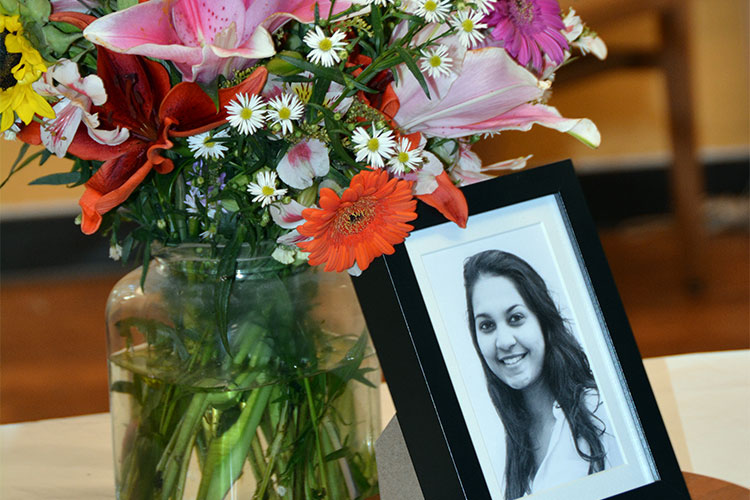
In Nice, just before the attack, Anjali Banerjee learned that her UC Berkeley friend Tarishi Jain, 18, had died in a terrorist attack in Bangladesh. (UC Berkeley photo by Hulda Nelson)
Leaving France for fall semester at Berkeley didn’t help.
“Experiencing a terrorist attack and then hearing, ‘Let’s build Tinder for Dogs’ — class projects that didn’t seem that important — felt useless and pointless,” says Tyler Heintz, 21, a computer science major. “We had something more critical to tackle: terrorism and the forces that cause these atrocities to happen.”
“Global security and human rights. Human security. We wanted to work on daunting problems,” adds Banerjee, now 20 and a history major. “We didn’t care that it was going to be difficult.”
They soon got their wish. At a Berkeley EIA reunion that September, Banerjee met Alice Ma, who had participated in the program the previous year. She’d just interned in Washington, D.C., at the Center on Sanctions and Illicit Finance and worked for Berkeley alumnus Yaya Fanusie, a former counterterrorism analyst in the U.S. intelligence community.
The think tank “does illicit finance investigations, such as tracking how terrorists get their money and weapons,” says Banerjee, “but Alice discovered it lacked the technology to make the work go quickly and easily.” She and Ma began ideating over coffee.
They soon recruited Heintz. “I’d been meeting with others from Nice about how the engineering skills we’d learned at Berkeley might address the causes of terrorism,” he says. “Alice wanted tech tools, and after one year of computer science, we had the background to build stuff like that.”
Fanusie helped Banerjee, Ma and Heintz create an eight-week Berkeley Innovation Collider course led by Ma, hosted by SCET and sponsored by the Center for Advanced Defense Studies (C4ADS), a nonprofit that addresses security challenges. The 22 students applied their data science skills to issues including terrorism, political corruption, sanctions evasion and human trafficking.
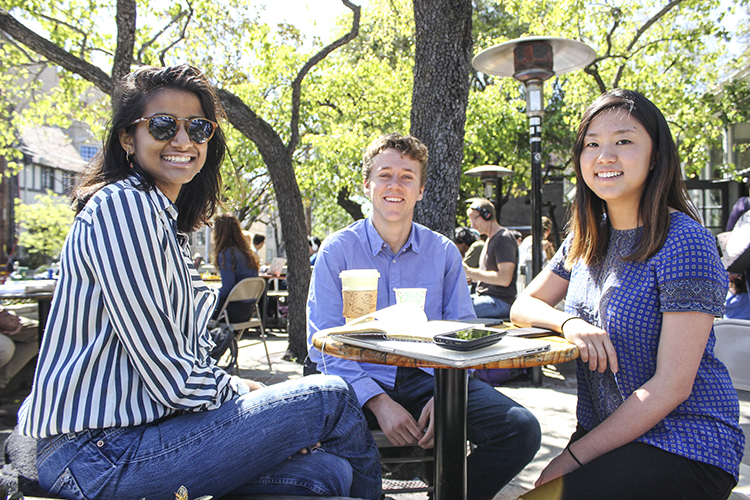
Archer’s team of 24 student volunteers, most of them engineering students, create tech tools to help analysts work more easily with big data as they track terrorism and its causes. (UC Berkeley photo by Jeremy Snowden)
In May 2017, the group flew to D.C. to pitch product demos — including a bitcoin investigative dashboard that helps track money laundering and a tool to trace the history of a specific flight — to leading experts in the counter-illicit finance space at both the Booz Allen Hamilton Innovation Center and the U.S. Department of the Treasury.
“Six of us got all dressed up, went into a giant conference room, and 20 people in suits came in. We were there four hours instead of one, and they loved what we’d built,” says Heintz of the U.S. Treasury visit. “Afterward, I was in disbelief, thinking, ‘What just happened?’ We felt very inspired and motivated and started laying the foundation to continue this effort.”
Ma, Banerjee and Heintz then cofounded Archer, later happily learning that’s the name of an animated sitcom character working for his mother’s spy agency and also “of one who’s precise in battle, very targeted in delivery,” says Banerjee. Today, their 24-member volunteer team has developed five free tools, including the recently launched SanctionsExplorer that Varun Vira, chief operating officer at C4ADS, says has been “widely embraced by investigators and the sanctions policy community.”
Next, the three cofounders will debut Archer and its products in Toronto at a May 16-18 summit for RightsCon, the world’s leading event on human rights in the digital age.
Guiding youth to find their hidden talents
After the bloodshed in Nice, rhetoric major Jarrett Wright, 35, says he was “in a fog, in a daze, debating why terrorist attacks happen and what caused things to go sideways” for the extremist, Mohamed Lahouaiej-Bouhlel, a Tunisian resident of France.
Lahouaiej-Bouhlel, 31, deliberately zigzagged more than a mile on the promenade at full speed, then was shot and killed by police after an exchange of gunfire. The Islamic State (ISIS) claimed responsibility for the attack.
“The answer I came to,” says Wright, “was ignorance, when people assume things about each other and develop irrational thoughts that can lead to a long chain of sinister events.”
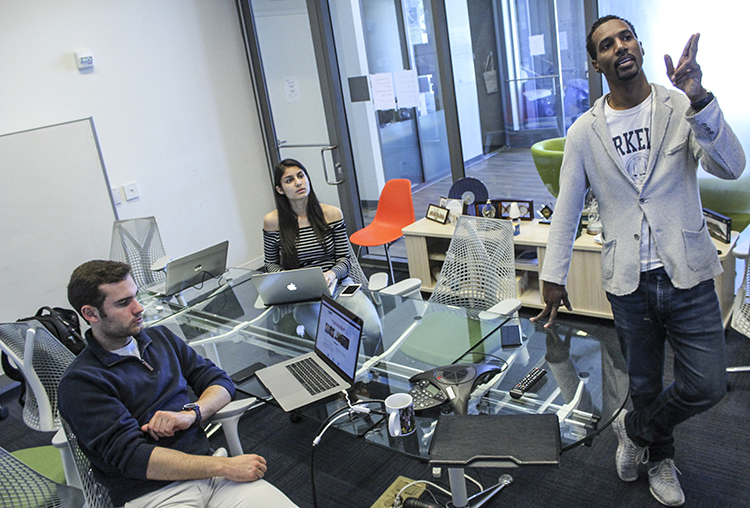
Startup With Purpose members Henry Keenan (left), Avdeep Dhillon and Jarrett Wright meet at the Sutardja Center for Entrepreneurship and Technology Stadium Space. (UC Berkeley photo by Jeremy Snowden)
To help remedy this, Wright and several other students jumped at a challenge from Singer: Create an entrepreneurship program for youth with big aspirations, but no chance of reaching them. The group chose Jordan, where 70 percent of the country’s people are under 30, often well-educated but unemployed, and prone to recruitment for terrorist activity.
“Jordan produces many bright and highly ambitious individuals,” says Singer. “But it still has a very family-owned business culture. If you’re not part of the right families, your access to opportunities is limited. This is the case for all communities ravaged by youth violence, from France to Mexico to Brazil. But it’s especially dangerous in the Middle East, where ISIS seduces the disenfranchised.”
Henry Keenan, 22, also volunteered. The Middle Eastern studies major had attended boarding school at King’s Academy in Madaba, Jordan, and in 2015, the EIA program in Nice. The terrorist attack made him “physically sick…I even cried in public for the first time in years,” he wrote in an email to Singer shortly after the rampage. “Terrible people will do anything to make the world a reflection of themselves. We cannot let them win.”
Today, Keenan, Wright, Gawronska and three others run Startup With Purpose, a nonprofit that in July will hold its second boot camp in Jordan. Last January, they brought together 20 Berkeley students and 200 Jordanian high school and college students to create companies together. Executives from Oracle, Google and US Market Access Center gave financial support and mentoring.
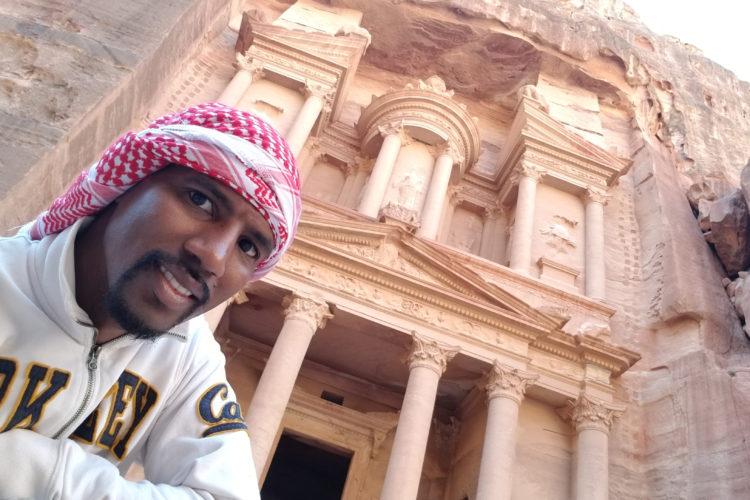
Jarrett Wright, on the Startup With Purpose team, says running entrepreneurial boot camps in the Middle East gives young people “super powers, the ability to execute their dreams.” (Photo by Jarrett Wright)
For a week from 8 a.m. to 10 p.m., the group learned what’s taught at Berkeley’s SCET — tech skills, entrepreneurial mindset, how to find one’s hidden talents and “ways to deal with cultural differences, to learn from each other, to become a cohesive, productive team with one purpose, creating a startup,” says Danielle Vivo, SCET program manager and an EIA course assistant in 2016.
Most of the students surveyed before camp planned to be bankers, doctors and lawyers. Afterward, says Keenan, “almost 100 percent of the Jordanians had changed their minds.”
Gaurav Boghale, global product marketing manager at Google and a mentor at the camp, says he saw “a definite change in the participants. Students went from being apathetic to engaged. There was a fluid exchange of culture, ideas and expertise. It was amazing to see.”
Next year, Startup With Purpose will repeat its program at King’s Academy and also in the capital, Amman. Future plans include translating the curriculum into Arabic, creating an Arabic-centric program and making Startup With Purpose an integral part of education in Jordan and throughout the Middle East and North Africa. They also hope to start a pilot program in the Bay Area.
Resilience and a new mission
Nearly two years since the attack, the students continue to heal. Some don’t talk about what happened. Many find comfort in the bonds they share — “It’s an unspoken connection,” says Wright — that began at the academy but deepened after the attack. Shortly after the attack, 12 of them even experienced being arrested together by French police, not knowing it was illegal to post flyers, like the ones they were tacking up for Leslie and the other missing students.
“We understand each other in ways others cannot,” says Gawronska. “We’ve lived the same thing, shared the same story.”
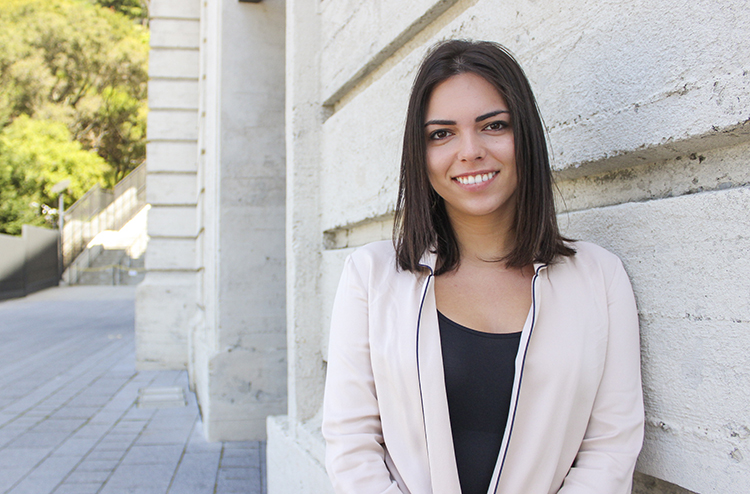
Sasha Gawronska says the Nice attack made her realize “the importance of understanding different ideas, beliefs and cultures.” (UC Berkeley photo by Jeremy Snowden)
Last summer, Gawronska says she rewrote her story “the way it should have ended.” She returned to Nice, and, on Bastille Day, completed the walk up the promenade that she never got to finish. The night of the attack, a series of mishaps, including cell phone reception trouble and a broken sandal, delayed her in meeting friends there. The terrorist struck — and struck her friends — before she arrived.
“Life is different than before the attack,” she admits. “But I’m thankful to be here, and I now appreciate the small things in life — like getting coffee, a sunny day, meeting someone new and even minor inconveniences and delays.”
But it’s believing in a cause, and working hard for it, that students in Archer and Startup With Purpose say fuels them most. Even those graduating this May — including Gawronska, Wright and Keenan — say they’ll continue indefinitely with the nonprofits they’ve built from scratch.
“Through that tragedy, that pain, that loss,” says Wright, “something beautiful sprouted.”